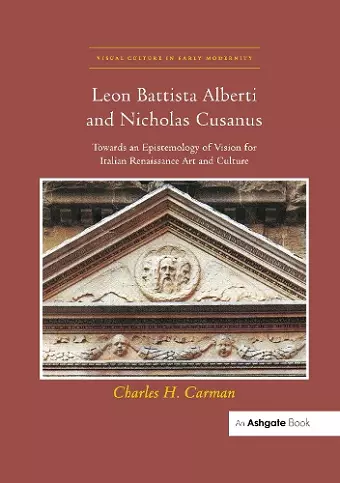Leon Battista Alberti and Nicholas Cusanus
Towards an Epistemology of Vision for Italian Renaissance Art and Culture
Format:Paperback
Publisher:Taylor & Francis Ltd
Published:2nd Aug '21
Currently unavailable, and unfortunately no date known when it will be back
This paperback is available in another edition too:
- Hardback£135.00(9781472429230)

Providing a fresh evaluation of Alberti’s text On Painting (1435), along with comparisons to various works of Nicholas Cusanus - particularly his Vision of God (1450) - this study reveals a shared epistemology of vision. And, the author argues, it is one that reflects a more deeply Christian Neoplatonic ideal than is typically accorded Alberti. Whether regarding his purpose in teaching the use of a geometric single point perspective system, or more broadly in rendering forms naturalistically, the emphasis leans toward the ideal of Renaissance art as highly rational. There remains the impression that the principle aim of the painter is to create objective, even illusionistic images. A close reading of Alberti’s text, however, including some adjustments in translation, points rather towards an emphasis on discerning the spiritual in the material. Alberti’s use of the tropes Minerva and Narcissus, for example, indicates the opposing characteristics of wisdom and sense certainty that function dialectically to foster the traditional importance of seeing with the eye of the intellect rather than merely with physical eyes. In this sense these figures also set the context for his, and, as the author explains, Brunelleschi’s earlier invention of this perspective system that posits not so much an objective seeing as an opposition of finite and infinite seeing, which, moreover, approximates Cusanus’s famous notion of a coincidence of opposites. Together with Alberti’s and Cusanus’s ideals of vision, extensive analysis of art works discloses a ubiquitous commitment to stimulating an intellectual perception of divine, essential, and unseen realities that enliven the visible material world.
'... casts new light on familiar material ...' Renaissance Quarterly
'The main strength of this book lies in Carman’s aptitude for close reading, and his keen analyses provide a fresh and nuanced encounter with Alberti’s On Painting. Carman also performs thorough inquiries into the meaning of key terms in Alberti’s work, such as istoria and nature. ...his sophisticated readings of Alberti’s work buttress the view that Renaissance culture was not only interested in that which can be observed in nature, but it also continued the medieval search for the ideal and fixed ontology of reality.' CAA Reviews
ISBN: 9780367433284
Dimensions: unknown
Weight: 400g
220 pages